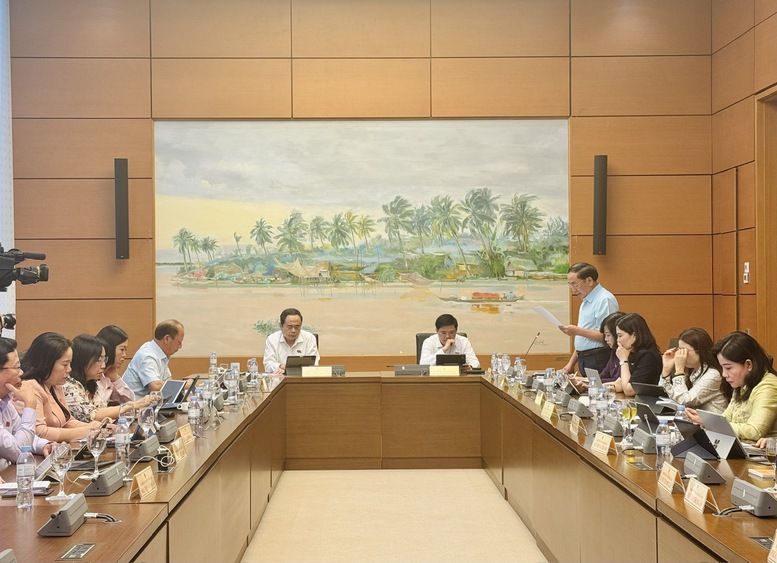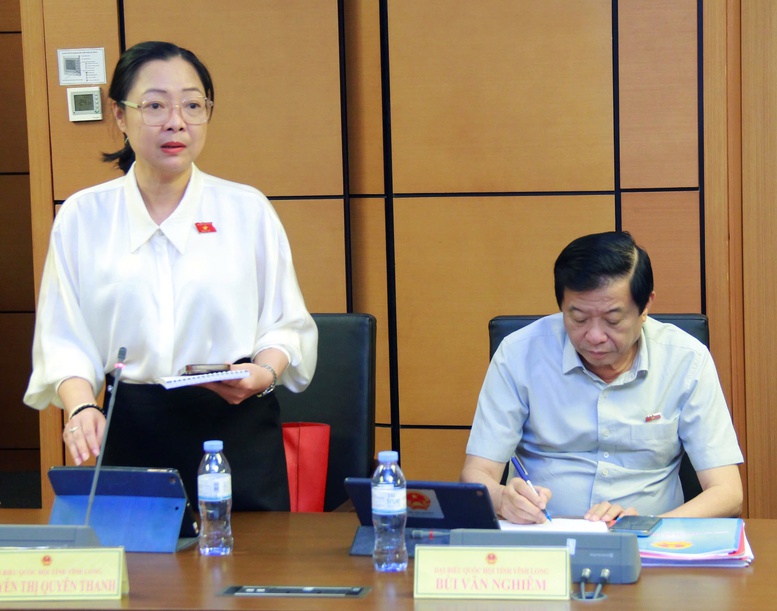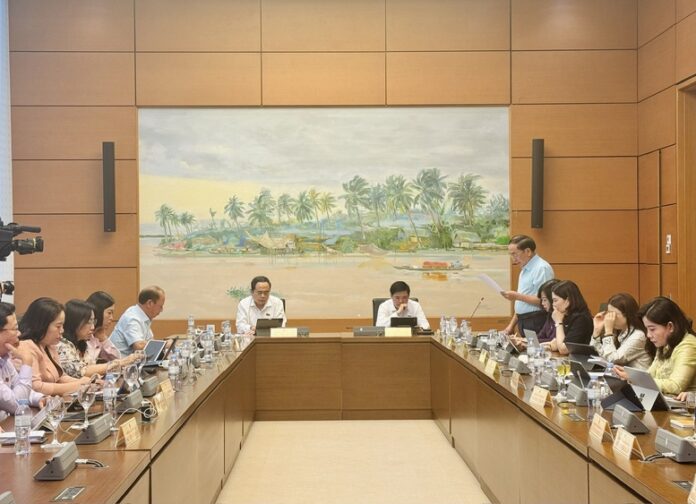
National Assembly delegates discuss at Group 13 – Photo: VGP/Thu Giang
On May 21st, the National Assembly continued its 9th session, discussing important issues including the draft resolution on reducing the value-added tax (VAT).
Speaking at Group 11 (including delegations from Bac Kan, Long An, Son La, and Vinh Long), delegate Nguyen Thi Quyen Thanh from Vinh Long province shared her thoughts on the context of the global and domestic economy, which is still fraught with risks and uncertainties. She believes that reducing VAT is an effective tool to boost domestic consumption, support production and business activities, and contribute to macroeconomic stability.
Delegate Thanh agreed with the government’s proposal to extend the implementation of this policy until the end of 2026 and expand the scope of beneficiaries. This is essential to institutionalize the economic and social growth target for 2025, aiming for an 8% increase in GDP, thereby laying the foundation for double-digit growth in the 2026-2030 period.
The tax reduction policy has proven to be highly effective since 2022. For instance, in 2022, it provided support worth VND 51.4 trillion to businesses and citizens, contributing to a nearly 20% increase in total retail sales and service revenue compared to 2021. In 2023, the policy continued to offer support of VND 23.4 trillion, resulting in a nearly 10% increase in consumption compared to the previous year. In 2024 alone, the support reached VND 49 trillion, helping achieve a GDP growth rate of 7.09%, inflation control at 3.63%, and a trade surplus of over $24 billion.
In the first two months of 2025, the estimated VAT reduction amounted to approximately VND 8.3 trillion. Consequently, the total retail sales and service revenue reached VND 1,137.5 trillion, a 9.4% increase compared to the same period last year. Additionally, the trade balance continued to maintain a surplus, valued at approximately $1.47 billion.

Delegate Nguyen Thi Quyen Thanh expressing her opinion at Group 11
Considering the impact on the state budget and enhancing tax management effectiveness
However, Delegate Nguyen Thi Quyen Thanh emphasized the importance of assessing the sustainability of the tax reduction policy and its impact on the state budget. According to the government’s report, the estimated reduction in state budget revenue for the last six months of 2025 is about VND 39.54 trillion, and for the whole of 2026, it is VND 82.2 trillion, totaling more than VND 121 trillion.
She suggested that the government strengthen efficient tax management measures, such as promoting digitalization, utilizing artificial intelligence (AI), and harnessing big data to manage tax debts and streamline tax refund processes. Additionally, there should be an emphasis on inspections, administrative reforms, and tighter tax collection in areas like real estate, e-commerce, and digital platform-based businesses.
Along with efficient tax management, budget expenditure should be managed rigorously and effectively, with a focus on cost-saving and mobilization of legal resources for urgent tasks, ensuring balanced budgets at all levels.
At Group 13 (Bac Ninh, Hau Giang, Dak Lak, and Lao Cai), Delegate Sung A Leng from Lao Cai province expressed his agreement with the content of the draft resolution, especially the proposal to reduce the VAT rate by 2% for goods and services currently subject to a 10% rate.
Delegate Sung A Leng viewed this as a solution that demonstrates the spirit of accompanying and supporting businesses and people in recovering production and stimulating consumption, given the potential challenges in the economy.
He supported the timeframe for implementing the policy from July 1, 2025, to December 31, 2026, considering it a step in the right direction, shifting from short-term to medium-term support, providing assurance for businesses to plan their production and operations.
However, to ensure adaptability and effectiveness, he suggested incorporating a mechanism for periodic evaluations and allowing for flexible adjustments in case of unexpected events like pandemics, natural disasters, or global economic risks. He also emphasized the need to simplify procedures for VAT declaration, deduction, and refund, and to enhance communication and support to ensure that small and micro-businesses, cooperatives, and households can easily access and benefit from this policy.
Delegate Le Minh Nam from Hau Giang province shared a similar perspective, agreeing with the government’s proposal and recognizing the importance of domestic consumption in driving economic growth.
He supported the expansion of the scope of beneficiaries, believing that it would boost purchasing power and stimulate consumption and domestic tourism, playing a crucial role in production and business activities.
However, Delegate Le Minh Nam cautioned that the impact on state budget revenues should be carefully assessed to ensure that the tax reduction policy aligns with mid-term fiscal stability and public debt safety goals. He suggested that the VAT reduction policy be implemented in conjunction with other tax policies, such as environmental protection taxes and special consumption taxes, to maintain consistency and avoid overlap.
Regarding the implementation process, Delegate Nam recommended that the government concretize governance solutions to ensure the policy’s effectiveness, from design to practical execution. He also supported the proposal to apply the policy for 1.5 years instead of six months, giving businesses sufficient time to absorb and adjust their production and business plans accordingly.
Implementing an “Export Incentive” Policy for Businesses
To stimulate economic growth and achieve development targets, Delegate Hoàng Văn Cường suggests implementing aggressive measures to support export businesses. He proposes a “reward-based export policy”, which involves offering incentives and removing legal obstacles faced by stagnant real estate projects. Additionally, encouraging private investment and expediting a mechanism for placing orders with large enterprises for state investment tasks are key aspects of this strategy.
Governor Nguyen Thi Hong: The Bad Debt of the Credit System is Currently High and on the Rise, Posing Significant Challenges for the Banking Sector
The governor emphasized the urgency of providing liquidity support to commercial banks through special lending facilities to ensure the safety and security of the credit system. Synchronizing the legal framework for dealing with non-performing loans will facilitate capital rotation and enhance credit accessibility for citizens and businesses alike.
“National Movement for Prosperity: Vietnam’s Race to Thrive”
“Vietnam is set to prioritize the development of its private sector. With a renewed focus on fostering a vibrant and diverse economy, the country aims to unleash the potential of its private enterprises. This strategic shift marks a pivotal moment in Vietnam’s economic journey, signaling a departure from traditional models and embracing a future driven by innovation and entrepreneurial spirit.”











![[Photo Essay]: Experts, Managers, and Businesses Unite to Forge a Path Towards Sustainable Green Industry](https://xe.today/wp-content/uploads/2025/07/z678592918-150x150.jpg)


![[Photo Essay]: Experts, Managers, and Businesses Unite to Forge a Path Towards Sustainable Green Industry](https://xe.today/wp-content/uploads/2025/07/z678592918-100x70.jpg)






